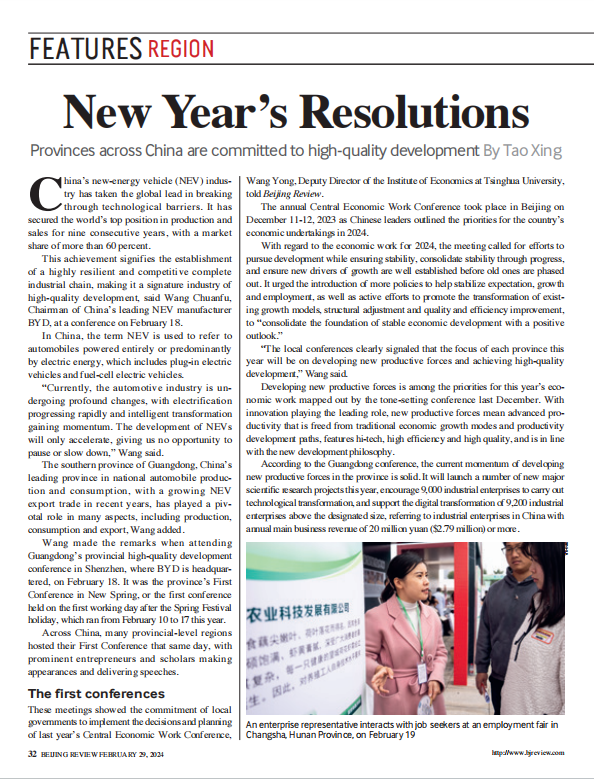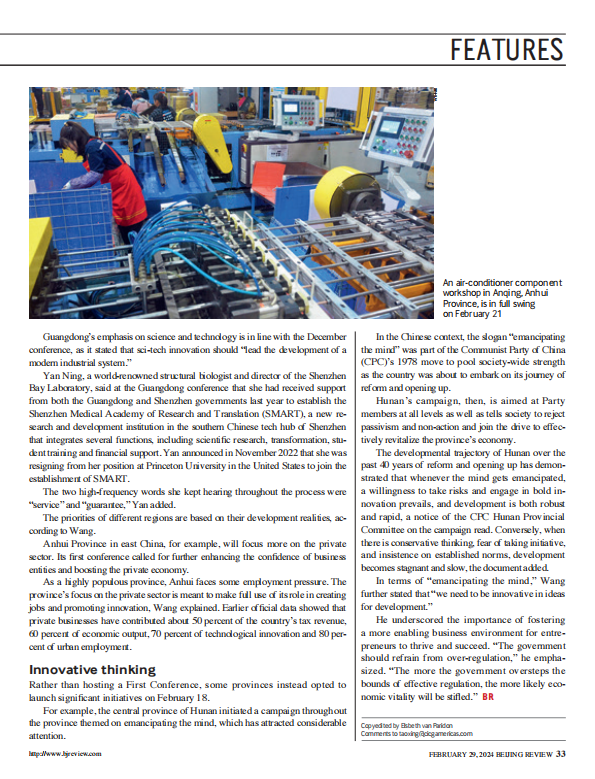近日,多地接连召开“新春第一会”,对新一年经济工作进行部署和动员,并聚焦特定主题谋划高质量发展。《北京周报》(BEIJING REVIEW)杂志邀请清华大学经济学研究所副所长、清华大学中国新型城镇化研究院特聘专家王勇对此进行解读。王勇教授表示,这些会议彰显了地方政府贯彻落实中央经济工作会议决策部署的决心,各省今年的重点工作将放在发展新质生产力和推动实现高质量发展上。同时,对于湖南省以“开展解放思想大讨论”作为开年第一要事,王勇教授认为,我们需要创新发展理念,进一步优化营商环境。


Provinces across China are committed to high-quality development
China's new-energy vehicle (NEV) industry has taken the global lead in breaking through technological barriers. It has secured the world's top position in production and sales for nine consecutive years, with a market share of more than 60 percent.
This achievement signifies the establishment of a highly resilient and competitive complete industrial chain, making it a signature industry of high-quality development, said Wang Chuanfu, Chairman of China's leading NEV manufacturer BYD, at a conference on February 18.
In China, the term NEV is used to refer to automobiles powered entirely or predominantly by electric energy, which includes plug-in electric vehicles and fuel-cell electric vehicles.
"Currently, the automotive industry is undergoing profound changes, with electrification progressing rapidly and intelligent transformation gaining momentum. The development of NEVs will only accelerate, giving us no opportunity to pause or slow down," Wang said.
The southern province of Guangdong, China's leading province in national automobile production and consumption, with a growing NEV export trade in recent years, has played a pivotal role in many aspects, including production, consumption and export, Wang added.
Wang made the remarks when attending Guangdong's provincial high-quality development conference in Shenzhen, where BYD is headquartered, on February 18. It was the province's First Conference in New Spring, or the first conference held on the first working day after the Spring Festival holiday, which ran from February 10 to 17 this year.
Across China, many provincial-level regions hosted their First Conference that same day, with prominent entrepreneurs and scholars making appearances and delivering speeches.
01 The first conferences
These meetings showed the commitment of local governments to implement the decisions and planning of last year's Central Economic Work Conference, Wang Yong, Deputy Director of the Institute of Economics at Tsinghua University, told Beijing Review.
The annual Central Economic Work Conference took place in Beijing on December 11-12, 2023 as Chinese leaders outlined the priorities for the country's economic undertakings in 2024.
With regard to the economic work for 2024, the meeting called for efforts to pursue development while ensuring stability, consolidate stability through progress, and ensure new drivers of growth are well established before old ones are phased out. It urged the introduction of more policies to help stabilize expectation, growth and employment, as well as active efforts to promote the transformation of existing growth models, structural adjustment and quality and efficiency improvement, to "consolidate the foundation of stable economic development with a positive outlook."
"The local conferences clearly signaled that the focus of each province this year will be on developing new productive forces and achieving high-quality development," Wang said.
Developing new productive forces is among the priorities for this year's economic work mapped out by the tone-setting conference last December. With innovation playing the leading role, new productive forces mean advanced productivity that is freed from traditional economic growth modes and productivity development paths, features hi-tech, high efficiency and high quality, and is in line with the new development philosophy.
According to the Guangdong conference, the current momentum of developing new productive forces in the province is solid. It will launch a number of new major scientific research projects this year, encourage 9,000 industrial enterprises to carry out technological transformation, and support the digital transformation of 9,200 industrial enterprises above the designated size, referring to industrial enterprises in China with annual main business revenue of 20 million yuan ($2.79 million) or more.
Guangdong's emphasis on science and technology is in line with the December conference, as it stated that sci-tech innovation should "lead the development of a modern industrial system."
Yan Ning, a world-renowned structural biologist and director of the Shenzhen Bay Laboratory, said at the Guangdong conference that she had received support from both the Guangdong and Shenzhen governments last year to establish the Shenzhen Medical Academy of Research and Translation (SMART), a new research and development institution in the southern Chinese tech hub of Shenzhen that integrates several functions, including scientific research, transformation, student training and financial support. Yan announced in November 2022 that she was resigning from her position at Princeton University in the United States to join the establishment of SMART.
The two high-frequency words she kept hearing throughout the process were "service" and "guarantee," Yan added.
The priorities of different regions are based on their development realities, according to Wang. Anhui Province in east China, for example, will focus more on the private sector. Its first conference called for further enhancing the confidence of business entities and boosting the private economy.
As a highly populous province, Anhui faces some employment pressure. The province's focus on the private sector is meant to make full use of its role in creating jobs and promoting innovation, Wang explained. Earlier official data showed that private businesses have contributed about 50 percent of the country's tax revenue, 60 percent of economic output, 70 percent of technological innovation and 80 percent of urban employment.
02 Innovative thinking
Rather than hosting a First Conference, some provinces instead opted to launch significant initiatives on February 18.
For example, the central province of Hunan initiated a campaign throughout the province themed on emancipating the mind, which has attracted considerable attention.
In the Chinese context, the slogan "emancipating the mind" was part of the Communist Party of China (CPC)'s 1978 move to pool society-wide strength as the country was about to embark on its journey of reform and opening up.
Hunan's campaign, then, is aimed at Party members at all levels as well as tells society to reject passivism and non-action and join the drive to effectively revitalize the province's economy.
The developmental trajectory of Hunan over the past 40 years of reform and opening up has demonstrated that whenever the mind gets emancipated, a willingness to take risks and engage in bold innovation prevails, and development is both robust and rapid, a notice of the CPC Hunan Provincial Committee on the campaign read. Conversely, when there is conservative thinking, fear of taking initiative, and insistence on established norms, development becomes stagnant and slow, the document added.
In terms of "emancipating the mind," Wang further stated that "we need to be innovative in ideas for development."
He underscored the importance of fostering a more enabling business environment for entrepreneurs to thrive and succeed. "The government should refrain from over-regulation," he emphasized. "The more the government oversteps the bounds of effective regulation, the more likely economic vitality will be stifled."
* 本文作者:《北京周报》记者 陶幸
Print Edition Title: New Year's Resolutions



